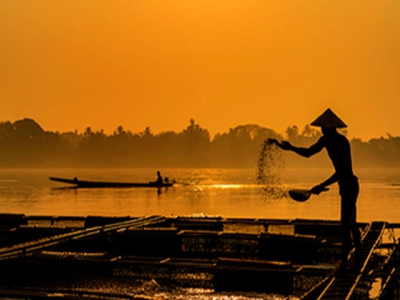Companies ink deal to use blockchain for protecting Thai aquaculture sector workers

Diginex, a global blockchain solutions company, has signed a long-term agreement with Verifik8 – a data intelligence and analytics provider for agribusiness suppliers – to help protect workers in the aquaculture sector in Thailand from exploitation by utilizing blockchain technology, Diginex said in a statement on 21 October.
Photo courtesy of Thirawatana Phaisalratana/Shutterstock
Under the agreement, Verifik8 will integrate eMin into its existing farming monitoring tools called Blue 8/Green 8, which are already being used by 5,000 workers on the ground in Thailand.
eMin is a blockchain-enabled tool developed by Diginex in partnership with the antislavery non-governmental organization Mekong Club. The tool is designed to help eradicate modern slavery through the worker recruitment process by recording employment contracts in a secure, traceable manner, according to Diginex.
Diginex, Mekong Club and Verifik8 all believe that employers, in both the private and public sector, can be the primary drivers of positive change towards resolving serious issues across the globe.
This agreement follows a successful pilot project with Verifik8 in February 2019, in which the tool was piloted at a shrimp farm in Phuket, Thailand.
The pilot project was funded in part by the British Embassy in Bangkok, which has been a vocal supporter of finding new and inventive solutions to modern slavery, following the enactment of the Modern Slavery Act in 2015. The United Kingdom has worked to support transparency in supply chains to reduce forced labor at home and abroad since then.
Mark Blick, head of government solutions at Diginex, said: “We are proud to be able to move from a pilot stage to wholesale rollout. This agreement is a natural progression in the evolution of eMin – proving that blockchain can have a positive impact and is more than just a ledger of transactions. Migrant workers can now own their data and can easily access their own contracts using this tool.”
Có thể bạn quan tâm
 Shrimp breeders expand production, seek to join global supply chains
Shrimp breeders expand production, seek to join global supply chains Local shrimp-breeding enterprises have mobilised investment from various sources to expand production in an aim to attract partners from shrimp supply chains
 Vietnam’s seafood falls in grades because of IUU yellow card
Vietnam’s seafood falls in grades because of IUU yellow card The EU was once the second biggest, just to the US, export market for Vietnam which consumed over 17 percent of Vietnam’s total export value.
 Vinh Phuc: aquaculture output up nearly 5 percent
Vinh Phuc: aquaculture output up nearly 5 percent The northern province of Vinh Phuc yielded over 16,500 tonnes of aquatic products in the first nine months of this year, up nearly 5 percent year-on-year.